9 German Food & Drink Idioms Posted by Constanze on Apr 19, 2017 in Food, Language
Guten Tag! Ich hoffe, es geht euch alle gut. Recently I came across the German idiom klar wie Kloßbrühe, which is the German version of the English ‘clear as crystal’. In German, this idiom literally translates to ‘clear as dumpling broth’. In other words, it has nothing to do with crystal. It had me thinking about how many other idioms there are that have nothing to do with food in English, but whose German equivalents are centred around food and drink. Let’s begin.
eins
German idiom: Klar wie Kloßbrühe
English: Clear as crystal/crystal clear
Literal translation of German idiom: ‘Clear as dumpling broth’
zwei
German idiom: Das ist mir Wurst
English: I don’t care
Literal translation of German idiom: ‘That is sausage to me’
drei
German idiom: Tomaten auf den Augen haben
English: To have rose-tinted glasses on/to be ‘blind’
Literal translation of German idiom: ‘To have tomatoes on the eyes’
vier
German idiom: Eine Extrawurst verlangen
English: To demand special treatment
Literal translation of German idiom: ‘To demand an extra sausage’
fünf
German idiom: Das ist nicht dein Bier!
English: That’s none of your business!
Literal translation of German idiom: ‘That is not your beer!’
sechs
German idiom: Du gehst mir auf den Keks
English: You’re getting on my nerves
Literal translation of German idiom: ‘You’re getting on my biscuit/cookie’
sieben
German idiom: Ein Haar in der Suppe haben
English: To have a fly in the ointment
Literal translation of German idiom: ‘To have a hair in the soup’
acht
German idiom: Sich aufbrezeln
English: To doll oneself up/get ready to go out
Literal translation of German idiom: ‘To pretzel oneself up’
neun
German idiom: Alles hat ein Ende, nur die Wurst hat zwei
English: All good things come to an end/everything must end sometime
Literal translation of German idiom: ‘Everything has an end, only the sausage has two’
This one – Alles hat ein Ende, nur die Wurst hat zwei – even has its own song. Of course I am going to share it! 😉
If you’ve enjoyed this post, check out this one on German idioms that feature the Teufel – devil!
Bis bald,
Constanze

Build vocabulary, practice pronunciation, and more with Transparent Language Online. Available anytime, anywhere, on any device.



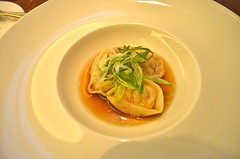


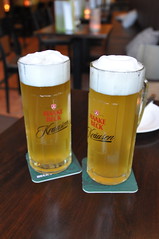
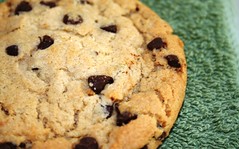
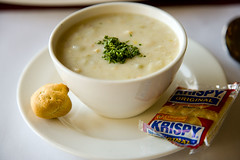
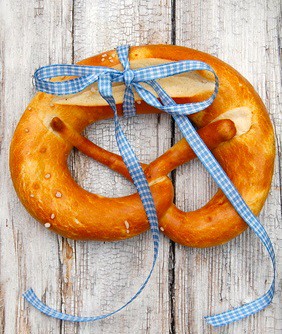

Comments:
Zach:
I like the phrase “Sich aufbrezeln” (probably because I like Brezeln). How does work in a sentence? Is it separable? Would it be “Wir brezeln sich für die Party auf”?
Constanze:
@Zach I like Brezeln, too!! And yes, it would be separable: ‘Ich brezle mich auf’ ‘Wir brezeln uns auf’ etc.
Sarah Falla:
Really enjoyed the recent post on food expressions. My mother as a child back in the 1930s remembers that a leftover lunchtime sandwich would be referred to as a “Hasenbrot” – have you heard this and do you know why?
Monica:
The meaning of: Du bist eine Flasche!